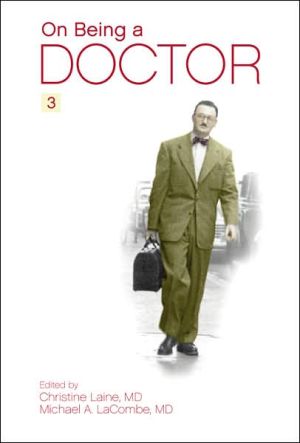

 |

|

The average rating for On Being a Doctor 3 based on 2 reviews is 4.5 stars.
Review # 1 was written on 2018-08-19 00:00:00 David Kaufman David KaufmanAs a doctor from Iraq, I thought that I will not find any resemblance between my experience here in Iraq and those of doctors overseas. But when I went through the book, I was astonished. It seems that we all as doctors pass through the same hard steps that will make us what we are. We have the same difficulties with patients, lawsuits, financial issues and administrative problems. I do recommend this book for all doctors or medical students that are willing to play an effective role in the health care system. |
Review # 2 was written on 2009-05-21 00:00:00 Rob Young Rob YoungMy first full introduction to Billy. Billiam. Sir Billemy. The book succeeded in showing many hints of what might lie at the core of the 'Osler Mystique'. I accidentally heard of his name from an online essay about medicine where 'Aequanimitas' was referenced by some commenter. And only then did I realize that I live two streets away from a street named for him, which leads into his hometown of Dundas, ON. So I eagerly dived into this book. I've mentioned the book's strength. Of Osler, I gather the following: He was a strenuously self-controlled man, and his professional (i.e. medical) success largely came from doing each day's work to the full and stacking up those daily victories over a career. His interpersonal prowess helped gather many people to himself, and his relational life was so rich for this reason. And his mastery of 'old Western classics' (starting with the Greeks) gave his writing a seemingly endless pool of allusions, and I'm sure they stretched his mind. The uniting principle of his life seems to be that he was a thoroughgoing progressive (in the 'progressive era'), blessed with a capacity for much. (Apropos of the mature Osler) It normed even his Christianity, if this author's depiction can be trusted near the end of the book where Osler cannot publicly grieve his son because his precious equanimity cannot be touched. The book ends on the subdued note, and despite its failures it at least got me interested in the man. I will hopefully read through Osler as I begin medical education. I can also thank him for furnishing me with the concept of 'day-tight compartments' (an evocative conception of time management). One small qualm about the book was that it seemed in places to be trying too hard to praise Osler. A lot of retrospective explanations of what must have been his genius in this or that area; this got old rather quickly. The book itself is an exercise in fanning the, admittedly tepid, flames of the Osler mystique. A doctor, seeing me read this book, remarked that Osler is most flogged today when presenters are seeking quotes on medical education. So I guess I'll be seeing more of him anyway. On y va. Other gems: Osler on learning medicine. "We take as our motto the old maxim: 'The whole art of medicine is in observation.'". Observe, record, tabulate, communicate. Use your five senses. the art of the practice of medicine is to be learned only by experience; 'tis not an inheritance; it cannot be revealed. Lean to see, learn to hear, learn to feel, learn to smell, and know that by practice alone can you become expert. Medicine is learned by the bedside and not in the classroom. Let not your conceptions of the manifestation of disease come from words heard in the lecture room or read form the book. See, and then reason and compare and control. But see first. No two eyes see the same thing. No two mirrors give forth the same reflection. Let your word be your slave and not your master. Live in the ward. Do not waste the hours of daylight in listening to that which you may read by night. But when you have seen, read. And when you can, read the original descriptions of the masters who, with crude methods of study, saw so clearly. Record that which you have seen; make a note at the time; do not wait. "The flighty purpose never is o'ertook, unless the deed go with it." Memory plays strange pranks with facts. The rocks and fissures and gullies of the mountain-side melt quickly into the smooth, blue outlines of the distant panorama. Viewed through the perspective of memory, an unrecorded observation, the vital details long since lost, easily changes ints countenance and sinks obediently into the frame fashioned by the fancy of the moment. Always note and record the unusual. Keep and compare your observations. Communicate or publish short notes on anything that is tricking or new. Do not waste your time in compilations, but wen your observation are sufficient, do not let them die with you. Study them, tabulate them, seek the points of contact which may reveal the underlying law. Some things can be learned only by statistical comparison. If you have the good fortune to command a large clinic, remember that one of your chief duties is the tabulation and analysis of the carefully recorded experience. (William Sydney Thayer paraphrasing bedside aphorisms gleaned from Osler, while at Johns Hopkins [p. 114]) |
CAN'T FIND WHAT YOU'RE LOOKING FOR? CLICK HERE!!!